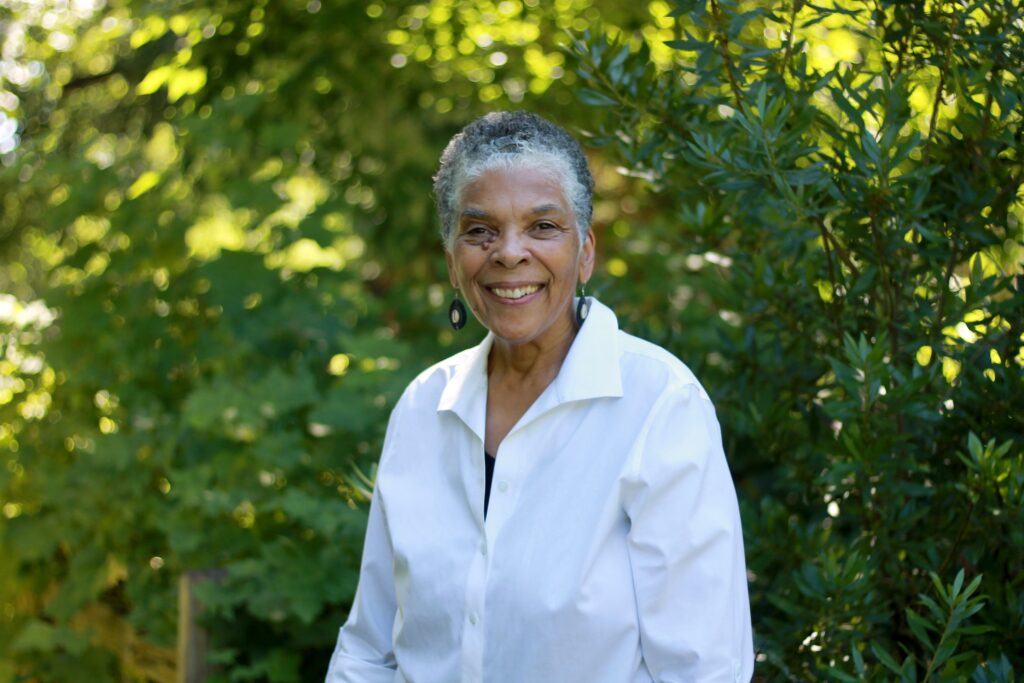Renee Anderson came home one day in fourth grade and announced that she planned to be a math educator someday.
Her teacher used cans and string to introduce the idea of Pi — the mathematical number that represents the distance around a circle divided by the distance across, which is always approximately 3.14. Anderson had proceeded to measure every circular thing she could find, only to discover that the rule of Pi worked out every time, like magic.
Decades later, for her, math still is.
Over an almost four-decade career in Oregon, Anderson was a fierce champion of math students, particularly Black children, in Portland Public Schools. She taught, mostly at Grant High School, and served as the first director of Oregon’s Mathematics, Engineering, Science Achievement program. Even after her pandemic era retirement, she remained instrumental in the continued regrowth of the Oregon Alliance of Black School Educators.
Last month, Anderson was one of 13 longtime Black educators
honored
by the Oregon Community Foundation — a philanthropic organization and the sixth largest community foundation in America — for their contributions to education.
“She is a brilliant passionate leader in so many ways,” said Marcy Bradley, Oregon Community Foundation’s chief community engagement and equity officer. “She reached beyond the four walls of the classroom.”
At the core of her work, Anderson said, is a passionate belief that all students can learn and succeed, if they have people supporting and pushing them.
“We know all kids can learn math,” Anderson said. “Having somebody who believes that you can do it is a big thing and that’s what I think is missing in schools for a lot of kids.”
Helping underrepresented math students
Anderson moved to Portland in the 1980s to start and run a Mathematics, Engineering, Science Achievement program, shorthanded as MESA, at Portland Public Schools. The program provides underrepresented students, many of them Black, opportunities to explore math and science, including through after school and summer sessions and field trips.
Anderson had been running the MESA program at San Francisco State University when leadership from Portland Public Schools, in an effort to find educators who had experience teaching a diversity of children, came across her work. After months of pressure from district leadership, Anderson ultimately made the move to Portland.
In Anderson’s decade at the helm, the MESA program blossomed to include 500 students. Today, it serves 700 children across 40 schools statewide.
The program has changed lives, according to Elizabeth Stock, the current director of Oregon MESA.
“She created opportunities for young people, especially those historically left out of (science, technology, engineering and math) fields, to see new possibilities for themselves,” Stock wrote of Anderson’s influence in an email. “Her belief in their potential didn’t just change classrooms, it changed life trajectories. Her legacy is deep, far-reaching and still growing.”
In the classroom
After stepping back from directing MESA, Anderson spent the next two decades in the classroom, largely at Grant High School in Northeast Portland.
Bryan Butcher Jr. was a student at Grant when Anderson taught there, before he went on to become an algebra teacher at Beaumont Middle School and win the 2025 Oregon Teacher of the Year award.
Butcher never took a class with Anderson, but said her reputation for caring, while also instilling a sense of responsibility into students was well-known throughout the school, even among students who weren’t in her math classes.
“She’d be patient enough to work with you and navigate the system, but she had a standard, she told you you’d be accountable,” Butcher recalled.
She was especially adept at helping students who were struggling.
At Grant, Anderson and a couple of other teachers developed a program — two periods of math for two years — to help students who had not received adequate math education in middle school succeed in high school classes. While students weren’t thrilled, Anderson said, almost all of them came out of the program on track to complete their high school math requirements.
Bradley said Anderson had a deep commitment to helping students who needed extra support, and would volunteer her time to help even non-Grant students learn.
“She would literally, for no money, spend hours helping the kids figure math out,” Bradley said. “These kids would come in thinking they were failures and they would leave knowing they were scholars.”
A devoted advocate
When Anderson was leading MESA in the 1980s and 90s, she learned that many Black children in Portland Public Schools weren’t being placed in the higher level math classes because some counselors assumed that they weren’t “ready” for it, Anderson said.
“It’s not that our kids could not learn math and science. It’s that they figured our kids could not learn math and science,” Anderson said.
So Anderson began a concerted effort to make sure that parents knew what classes their children were supposed to be enrolled in and that counselors were actually enrolling them in those classes. After that, Anderson said math scores among Black students increased.
“It wasn’t because all of a sudden they got smart. It was because they were letting them take the classes and they were getting support,” Anderson said.
As a teacher, Anderson knew that sometimes students didn’t have a parent at home advocating for them. So she would take on that role, a task that put her at odds with administrators on occasion. Anderson remembers one student in her class who had attendance problems because her father was in jail and her grandmother was struggling with addiction.
“When I got her, I said, ‘I need you to focus on one thing: getting to school every single day,’” Anderson said.
One time the girl didn’t show up to Anderson’s class, so Anderson said she headed downstairs during her planning period and asked the counselor to call the student. A vice principal overheard the conversation.
“This vice principal told me that I didn’t understand Black kids,” Anderson said. “But if she’s staying home with her grandmother, is she getting an education?”
An integral part of Oregon education to this day
While Anderson hasn’t taught in a classroom since 2020, she hasn’t retired from Oregon education. Anderson has been working to help revitalize the Oregon Alliance for Black School Educators and rebuild a community of Black teachers.
When Anderson first moved to Portland, she saw the city as a “mecca for Black educators,” with robust engagement and a variety of professional support from the alliance. But Anderson eventually left the alliance to spend more time with her kids and when it came back on her radar in 2012, she realized a lot of other Black educators had too.
Anderson said the alliance lacked membership and wasn’t providing Black educators with professional and community-building opportunities.
“Every time I went to a school, I checked in to see what black educators were at the schools,” Anderson said. “And morale was really low.”
Anderson and others made a concerted effort to rebuild the community, starting first with Black educator gatherings and, over the last decade, expanding to offer workshops, grants, mentorship and other resources.
Butcher said that the consistency of Anderson’s involvement — being present at conferences, checking in with individual teachers, sending emails — has helped young Black educators like himself.
“Having someone like Ms. Anderson reminds you that you are not in this alone. … This is what it feels like to have a community,” Butcher said.
More Oregon education stories
-
Oregon’s pandemic kindergartners prepare for middle school with critical reading gaps
-
Some Jewish teachers say they were harassed and threatened at national education convention in Portland
-
Portland Community College cuts programs to fight budget deficit
-
Oregon schools brace for cuts as Trump administration withholds tens of millions
-
UO’s journalism dean resigns following scrutiny of travel, finances
Beyond the alliance, Anderson is the co-chair of the state’s African American/Black Student Success Advisory Group, on the board of the Multnomah Education Service District and continues to tutor students in need.
“I know all students can learn, because I saw it,” Anderson said. “We just have to figure out where to meet them.”
— Eddy Binford-Ross covers education and local politics for The Oregonian/OregonLive.





More Stories
Portland math educator honored for 40-year career championing Black students
Portland math educator honored for 40-year career championing Black students
Portland math educator honored for 40-year career championing Black students